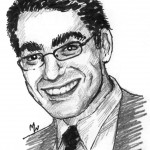The recent shenanigans in the Near Eastern Languages and Civilization Department provides a huge opportunity for News reporting and campus gossip. We have the perfect sort of scandal, created by a nexus of power, sex and caricature-like personalities. What’s more, the abuse of an official university position gives us the cover to pretend that all the sordid details of this unfortunate affair are our collective business. But they are not, and focusing on these details is distracting and counterproductive. I hope this paper, and the Yale community in general, manages to take the high road.
[media-credit id=14887 align=”alignleft” width=”150″] [/media-credit]The cast of characters involved in this story seems to serve as the perfect basis for a Maureen Dowd column. One can only imagine the field day that the columnist who brought us Al Gore talking to his bald spot would have with the monocle-wearing department chair and the Cleopatra appearance of the Egyptology professor.
[/media-credit]The cast of characters involved in this story seems to serve as the perfect basis for a Maureen Dowd column. One can only imagine the field day that the columnist who brought us Al Gore talking to his bald spot would have with the monocle-wearing department chair and the Cleopatra appearance of the Egyptology professor.
But I have never really liked Ms. Dowd’s columns. They’re heavy on sarcasm and light on substance. Yet Dowd remains incredibly popular, and of course, she has a Pulitzer. So her popularity speaks to a strong tendency in today’s media and public discourse: to use the public positions of public figures as an excuse for maintaining a constant focus on their personal foibles and private lives. I certainly identify with that tendency. When a News reporter called my home this past weekend hoping to speak with my brother (who majored in NELC a few years ago), I immediately started hunting the web for backstory. It was tremendous fun. And on getting back to school, “Do you know what’s going on in the NELC Department?” was almost as frequent a greeting as “How was your break?”
Most of us take pleasure in the sudden revelation of illicit behavior, especially when sex and power are involved. We want to know all the sordid details, who did precisely what, where and when. But we know on some level that we shouldn’t. So we justify our voyeurism under the pretense of the public interest and institutional reforms. We claim to be motivated by the desire to protect future victims, preserve the University’s integrity and ensure that official decisions were made properly.
To some extent, these concerns are entirely appropriate. Questions of administrative transparency and apparent dysfunction in NELC Department ought to be thoroughly investigated. The possibility of willful blindness by other members of the faculty and University administration should be pursued doggedly and publicly reported.
As importantly, the potential for abuse in the power dynamic between teachers and students, especially by charismatic teachers who feed off students’ adulation, should be discussed widely. The fact that in 2007, a writer for the News could quite nonchalantly report that professor John Darnell “banged on the wall of his office to summon assistant professor Colleen Manassa” while humorously justifying his behavior by explaining that “some people say I take the ‘assistant’ part of ‘assistant professor’ a little literally” is disturbing. Certainly, that is the sort of thing that an open discussion about the NELC situation might change.
But it is all too easy to slip from a discussion of the substantive lessons that might be taken from this affair into pure gossip mongering. The state of professors’ marriages and the particular details of their intimate relationships — even when illicit — are none of our business. What’s more, fixation on these sorts of details does nothing but damage.
The soap opera-ization of our teachers diminishes from their natural authority and wreaks havoc with the overall respect that established scholars should command. It distracts us from substantive issues, pulling our attention away from legitimate questions of structural reforms. Worse, it creates a bizarre sense of normal, accustoming us to the very behavior that ought to turn our stomachs. And perhaps worst of all, it allows us the delusion that we are all so much better; by fixating on the misbehavior of the few and the prominent, we allow ourselves off the hook for the trusts we have betrayed and the positions we have abused.
So even as this sorry story continues to unfold, on the pages of the News and over lunches at Commons, bear in mind the dangers of voyeurism. Insist on disclosure, transparency and reforms where they belong. At the same time, we ought remember that mockery is not journalism and gossip is not advocacy. We must realize that the public interest is served not only through thorough reporting, but also careful storytelling. And the decision to leave some details unrevealed and some angles unexplored might be nearly as important as the story itself.
Yishai Schwartz is a senior in Branford College. Contact him at yishai.schwartz@yale.edu .







